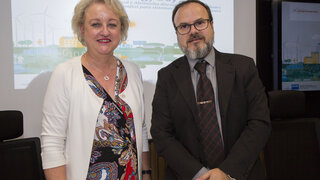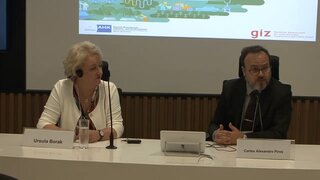Energy Day brings debate on transitions in energy systems in Brazil and Germany
Event brought together experts from both countries to discuss renewable energy opportunities and challenges
The second edition of the Energy Day, which had as its central theme the Energy Systems of the Future, brought together more than 80 representatives of the energy sector on Thursday (4/7/19), at Eletrobras' headquarters in Rio de Janeiro, and presented contributions to Brazil's energy transition. The event, which is an initiative of the cooperation between the Ministry of Mines and Energy (MME) and the German Ministry of Economic Affairs and Energy (BMWi), and executed by the Deutsche Gesellschaft für Internationale Zusammenarbeit (GIZ), was promoted by the German-Brazilian Chamber of Commerce and Industry of Rio de Janeiro (AHK Rio).
The Energy Day sought to further strengthen the partnership between Brazil and Germany in the renewable energy sector. Brazil currently reaches a production level of 85% of renewables, while Germany, which has seen strong growth in recent years, reaches 35% - more than half of which is wind power. During the sessions, the paths taken by the two countries were presented and, in the panel discussion, the participants discussed market opportunities and challenges brought by the transitions in energy systems.
On the occasion, MME and Procel (National Electric Energy Conservation Program) presented Lab Procel, a startups support program that aims to accelerate solutions for Eletrobras through the implementation of an open innovation hub.
In addition, there was the launch of the Brazil-Germany Energy Partnerships website, with information on the technical cooperation program and actions developed.
Sessions
In the first session, Philipp Hauser, director for Latin America of Agora Energiewende, and Luiz Barroso, CEO of PSR and Chairman of the E+ Panel Institute, spoke about the changes in energy systems in both Brazil and Germany. According to Hauser, research carried out by Agora has shown that there is common ground for the energy transition of the two countries: only with an inclusive dialogue can a long-term state policy be created, and a clear legal and regulatory environment is needed to reduce the costs of expansion and regulation of renewable energy. "If all this is well considered, we realize that it is a great economic opportunity for Brazil," he said.
For Barroso, Brazil is already ahead because it already has a renewable matrix and can use the technologies developed in other countries, but it is important to create targets for energy transformation and make it economically efficient: "Renewable energy has reset the difference in knowledge, public policies and regulation in all countries. [...] This levelled the playing field and made cooperation, like Brazil-Germany, play a fundamental role".
The tariff structure was discussed during the second session by Thiago Barral, president of the Energy Research Company (EPE), and Markus Merkel, senior consultant at Merkel Consulting. The central challenge for the countries is to plan and prepare for digitization and new models, but without forgetting the final consumer, strengthening communication about the real value of energy and valuing the so-called "prosumer", network users who now also produce energy. "It is not up to us to predict the future, but to prepare, through policies, regulation and market design, for this system to be functional and fair in the allocation of costs and risks," Barral summarized.
In the debate panel, four representatives participated in a dicussion: Philipp Hahn, from AHK Rio; Alexandre Lopes, technical director at the Brazilian Association of Energy Retailers (ABRACEEL); Marco Delgado, technical director in the Brazilian Association of Electric Energy Distributors (ABRADEE) and Tiago Barros, president of RegE Barros Correia Advisers and former director of ANEEL.
At the wrap-up, made by the director of international affairs of BMWi, Ursula Borak, and by the director of the Department of Energy Development (DDE) of MME, Carlos Alexandre Pires, was highlighted the importance of the event not only for the two countries, but also to expand the participation of society in the debate on energy. Although the history of the two countries is different, the energy goals of both are close and have in common the goal of improving the system with solutions that are also economically sustainable, said the director of BMWi.
Impressions from the Energy Day 2019

Event's Live Streaming


